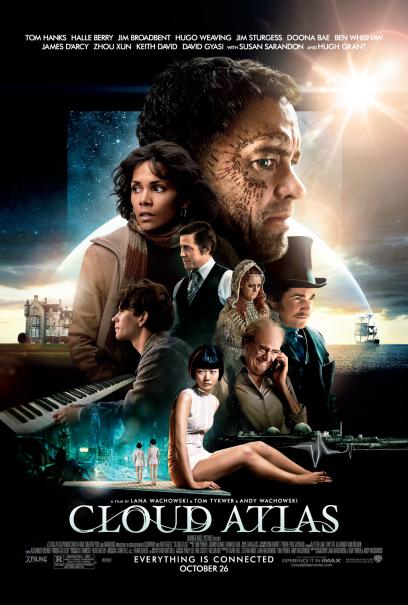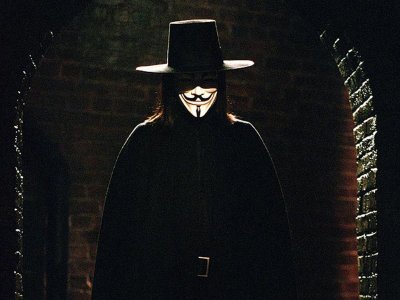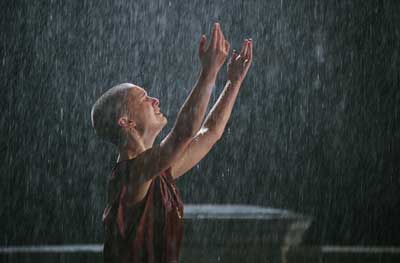Cloud Atlas (2012)
 DIRECTOR: Andy Wachowski, Lana Wachowski, Tom Tykwer
DIRECTOR: Andy Wachowski, Lana Wachowski, Tom Tykwer
CAST: Tom Hanks, Halle Berry, Jim Broadbent, Hugo Weaving, Jim Sturgess, Ben Whishaw, Doona Bae, James D’Arcy, Hugh Grant, Susan Sarandon, Keith David, David Gyasi
REVIEW:
The film adaptation of David Mitchell’s 2004 novel, a German production co-directed by the Wachowski siblings behind The Matrix and German director Tom Tykwer, is nothing if not ambitious. Continue reading
Captain America: The First Avenger (2011)
DIRECTOR: Joe Johnston
CAST:
Chris Evans, Hayley Atwell, Tommy Lee Jones, Hugo Weaving, Stanley Tucci, Toby Jones, Dominic Cooper, Sebastian Stan, Neal McDonough, Derek Luke
REVIEW:
Captain America is an adequate, serviceable comic book superhero origin movie that doesn’t merit any scorn but also doesn’t generate overwhelming enthusiasm. Tying in with Iron Man, Iron Man 2, and Thor, it’s the last of the Marvel comics movies introducing each of the individual Avengers who will be united onscreen in 2012’s The Avengers, and it’s debatable whether the Cap’n would have seen the screen otherwise. Despite his long-running existence in the comics (since 1941), Captain America is no longer considered among the top tier of comic book superheroes. Part of the problem is probably also that audiences and reviewers are suffering comic book superhero fatigue; with so many superhero origin stories hitting the screens, it’s hard to make them all stand out, and the fact that they all inevitably follow the same basic formula makes it start to seem generic after so many times. I enjoyed the film, but was mildly underwhelmed. The self-consciously titled The First Avenger isn’t a terrible movie, but it lacks the certain spark that set Iron Man above the pack. Continue reading
V For Vendetta (2006)
DIRECTOR: James McTeigue
CAST:
Hugo Weaving, Natalie Portman, Stephen Rea, Stephen Fry, John Hurt, Tim Pigott-Smith
REVIEW:
Based on the controversial graphic novel by Alan Moore, and produced by the Wackowski brothers behind The Matrix, V For Vendetta mostly succeeds at serving up both entertaining action and a few eerily timely bits of political commentary, and represents a case of being entertained without having to leave your brain at the door.
On November 5, 1605, as many will know, a man named Guy Fawkes attempted to blow up Parliament and was hanged for his trouble. In the future, with war and a deadly biological terrorist attack (or at least that’s the official story) leading to order being restored in Britain by a Fascist totalitarian government, a man known only as V (Hugo Weaving), who hides his burned features behind a Guy Fawkes mask, seeks to unleash a wave of theatrics, rabble-rousing, bombings of London landmarks, and assassinations of prominent government officials that will culminate in the destruction of Parliament on Guy Fawkes Day. Like the man he emulates, V is either a freedom fighter or a terrorist depending on who you talk to. This is the dilemma faced by Evey Hammond (Natalie Portman), an ordinary citizen whom V saves from rape by the thuggish police after being caught on the street after curfew and then casually invites to watch as he detonates the Old Bailey building, the opening salvo of his one-man fight. The dictatorship, headed by the rarely-seen High Chancellor Sutler (John Hurt), tries to maintain a facade of control by explaining the building as a planned demolition, but V theatrically takes over a major news network to set the record straight. Over the next year, V moves like a wraith through London, simultaneously setting his government overthrow in motion and carrying out a personal vendetta against the government officials involved in his past sufferings. Evey tags along, not entirely willingly at first, then having to decide whether to escape V or support him. Meanwhile, Inspector Finch (Stephen Rea) is leading the investigation to stop V, but in the process stumbles across buried atrocities that make him question whether the real villain might be his own government.
 V for Vendetta is a rousing and thought-provoking experience even when it threatens to lapse into overwrought chaos. Like The Matrix, it’s bursting with ideas beneath its stylized action surface. It contains any number of moments to get the pulse quickening and the nape hairs standing, and asks tough questions about how far we should go in the name of security, and what defines a terrorist. The filmmakers also don’t let the stylized look and feel overwhelm the human element. In fact, the most indelible part of the movie is a lengthy subplot in which Evey reads the letter of a lesbian prisoner tortured and murdered by the government, that is so striking because its inclusion is so unexpected. And it’s hard not to see shades of Phantom of the Opera in the relationship between V and Evey. Like The Phantom, V hides disfigurements behind a mask and threatens to let personal vengeance overwhelm his claims of righteousness.
V for Vendetta is a rousing and thought-provoking experience even when it threatens to lapse into overwrought chaos. Like The Matrix, it’s bursting with ideas beneath its stylized action surface. It contains any number of moments to get the pulse quickening and the nape hairs standing, and asks tough questions about how far we should go in the name of security, and what defines a terrorist. The filmmakers also don’t let the stylized look and feel overwhelm the human element. In fact, the most indelible part of the movie is a lengthy subplot in which Evey reads the letter of a lesbian prisoner tortured and murdered by the government, that is so striking because its inclusion is so unexpected. And it’s hard not to see shades of Phantom of the Opera in the relationship between V and Evey. Like The Phantom, V hides disfigurements behind a mask and threatens to let personal vengeance overwhelm his claims of righteousness.
It’s telling of Hugo Weaving’s acting ability that he manages to generate such a strong, charismatic screen presence without once showing his face (his mask is unmoving, meaning he has no way of conveying even a hint of emotion with anything other than his voice and body language). Weaving uses his meticulously precise enunciation and commanding vocal tones to great effect- he delivers a rapid-fire monologue in which every word starts with v that has to be heard to be believe- and also gets to engage in a little Errol Flynn-style swashbuckling (although the fact that V’s features are hidden makes it impossible to determine when it is Weaving and his fight double). Natalie Portman is adequate, and at various times more than adequate, but her performance is a little uneven, and her somewhat forced English accent is somewhat distracting. Portman is particularly good during the infamous torture scene where her head is shaved, but also a few too many moments where she doesn’t seem to quite have quite a firm handle on her character. More solid is Stephen Rea, who uses his usual hangdog demeanor to good effect as Inspector Finch. In fact, despite his low-key performance, Rea’s Finch could be said to be the most three-dimensional and sympathetic character in the movie- a man with a job to do who finds nothing about his job is turning out as simple as he expects. In smaller roles, Stephen Fry is a talk show host who uses his program to slip in dissent against the government and befriends Evey, and John Hurt spends 99% of his limited screentime with his ever-angry visage amusingly projected onto a wall-sized television monitor faced by a half-circle of dwarfed underlings like some embodiment of Big Brother while he snarls and thunders about V’s antics. As his secret police chief henchman, and arguably the real primary villain, Tim Pigott-Smith is suitably oily.
 The climax is easily the weakest thing about V for Vendetta. In particular, our final brief face-to-face with Chancellor Sutler is disappointingly anti-climactic. One wonders if the filmmakers were making a statement about some dictators being figureheads to the real power behind the throne, or one’s public image not matching up with the real person, but in any case, Sutler turning out to be so pathetic kills the momentum provided by a centralized hub of villainy to battle against, and once he’s quickly here and gone, all we have left is a shootout enlivened with some (arguably too many) moves obviously inspired by The Matrix, and the destruction of Parliament, which seems a little pointless. I understand a large part of V’s mission is symbolic, creating grand spectacles to snap the public out of their apathy, but since the dictatorship has been effectively destroyed by this point, it seems the gratuitous annihilation of a historic British building. Then again, maybe we’re not supposed to be sympathizing with V by this point. In any case, the climax is disappointingly flat, even with the cool fight scenes and massive explosions, considering the build the narrative had generated leading up to it. The dictatorship goes out with a disappointing and rather anti-climactic whimper, even if V and Evey send it off with a closing bang.
The climax is easily the weakest thing about V for Vendetta. In particular, our final brief face-to-face with Chancellor Sutler is disappointingly anti-climactic. One wonders if the filmmakers were making a statement about some dictators being figureheads to the real power behind the throne, or one’s public image not matching up with the real person, but in any case, Sutler turning out to be so pathetic kills the momentum provided by a centralized hub of villainy to battle against, and once he’s quickly here and gone, all we have left is a shootout enlivened with some (arguably too many) moves obviously inspired by The Matrix, and the destruction of Parliament, which seems a little pointless. I understand a large part of V’s mission is symbolic, creating grand spectacles to snap the public out of their apathy, but since the dictatorship has been effectively destroyed by this point, it seems the gratuitous annihilation of a historic British building. Then again, maybe we’re not supposed to be sympathizing with V by this point. In any case, the climax is disappointingly flat, even with the cool fight scenes and massive explosions, considering the build the narrative had generated leading up to it. The dictatorship goes out with a disappointing and rather anti-climactic whimper, even if V and Evey send it off with a closing bang.
Even so, V for Vendetta is frequently thrilling, frequently thought-provoking, possessed of both a mind and a heart, and serves up a far richer experience than your average action thriller.
***
The Lord of the Rings: The Fellowship of the Ring (2001)
CAST: Elijah Wood, Ian McKellen, Viggo Mortensen, Sean Astin, Sean Bean, Liv Tyler, Cate Blanchett, John Rhys-Davies, Billy Boyd, Dominic Monaghan, Orlando Bloom, Christopher Lee, Ian Holm, Hugo Weaving, Andy Serkis
REVIEW:
The origins of this epic film trilogy date back to the early 1930s, when a British scholar named J.R.R. Tolkien began writing an equally epic series of books. The first to be completed and published was The Hobbit in 1937, but Tolkien had a more ambitious story in mind. Originally setting out to write one enormous novel, he ultimately realized that such a tale as he was spinning was too vast to be contained in one book, and instead formed it into a trilogy. Parts one and two, The Fellowship of the Ring and The Two Towers, were released in 1954, followed by the climax, The Return of the King, in 1957. Together, the trilogy was known as The Lord of the Rings. The significance of this fantasy series cannot be understated. Tolkien’s books were adored by millions the world over during his time, and since his death in 1973, they have remained a beloved and integral part of the fantasy literature genre. With such a following, it was inevitable that film versions would at least be attempted, but few filmmakers had either the inclination or the means to tackle such a daunting production. Mediocre animated versions of both The Lord of the Rings and its prequel The Hobbit were made—and flopped—in the 1970s, with the poor quality of the animation and various story omissions rankling fans. Two more decades passed, and finally New Zealand director Peter Jackson has taken on the ambitious task of bringing Tolkien’s epic trilogy to the big screen with the backing of New Line Cinema’s investment of nearly $300 million for the package deal of all three installments. Those worried about whether it is even possible to translate The Lord of the Rings intact to the screen can breathe a sigh of relief, at least if this first installment is any indication. Jackson and his cast and crew have succeeded on every level, and the result is not only a definitive film adaptation of part one of one of the most popular fantasy stories ever written, not only a majestic, enthralling adventure in its own right, but itself a pinnacle in filmmaking, one of the most colossal film productions ever made, and raising the meaning of “epic filmmaking” to a whole new level. In the future all epic fantasy adventures—including its own sequels—will have a high bar to hurdle. Continue reading
